Anatomy of an NBA champion: Which 2021 teams fit the statistical profile?
What does a champion look like?
Anyone familiar with the pantheon of NBA champions knows that certain teams have dominated - only 12 franchises have won the last 41 titles. But what do those champions have in common? Do they provide a statistical profile we can use to learn about this year's playoffs?
When we're looking for statistical similarities among championship teams to help us evaluate this year's postseason field, we'll use the last 16 seasons. The NBA's current 30-team, six-division scheduling format has been in place since 2004-05. The league had already adopted rules that prioritized offense by eliminating hand-checking and illegal defenses. And it's also recent enough to account for the modern importance of 3-point shooting.
Let's dig into the numbers that link these NBA champions and see what they say about this year's playoff teams.
Wins
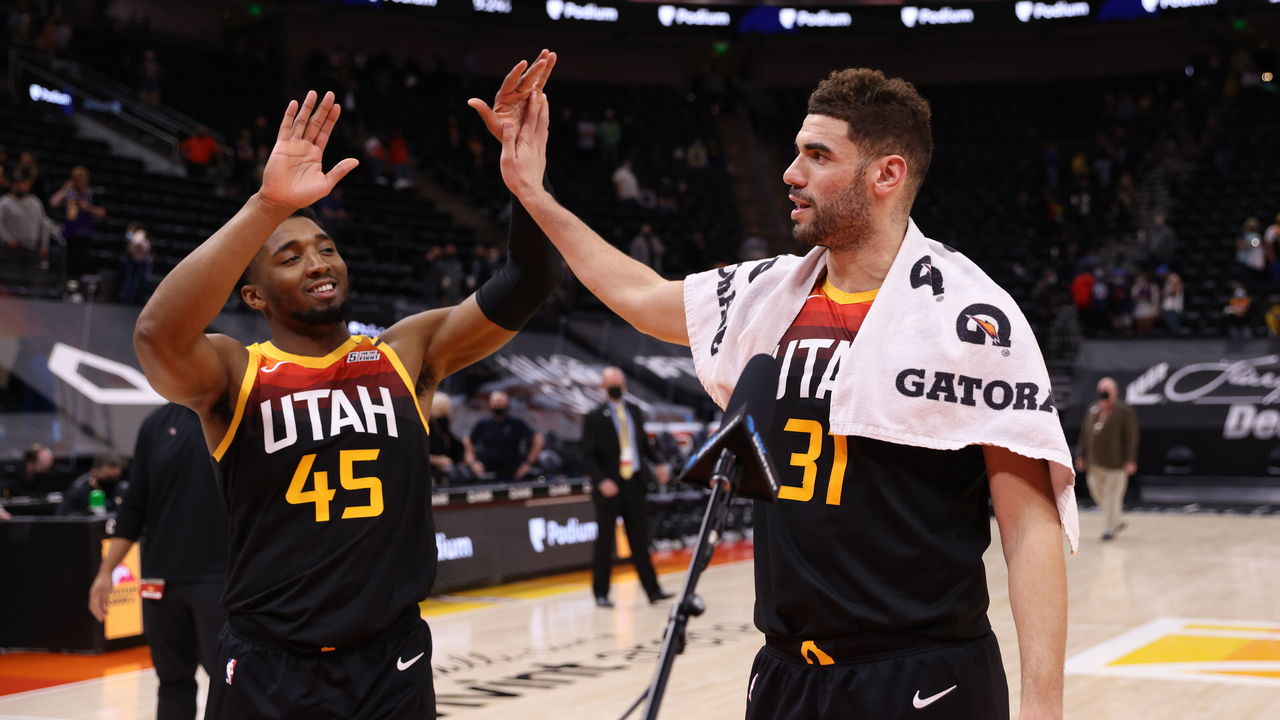
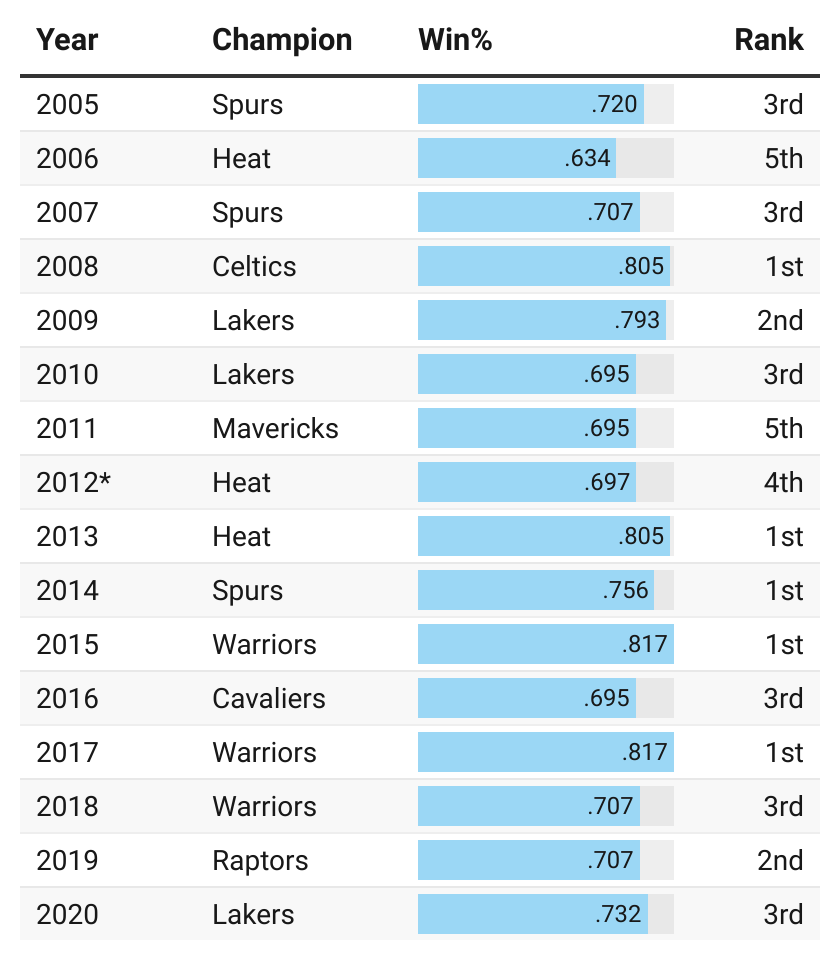
Modern champions compiled a minimum win percentage of .634 - the equivalent of 52 wins in 82 games - and a top-five overall record during the regular season.
Even that might be a bit conservative, as the winning percentage outlier, the 2005-06 Heat, were on a 55-win pace (41-20) after Pat Riley took over coaching duties from Stan Van Gundy and a 58-win pace (42-17) with Shaquille O'Neal in the lineup after the big man missed 18 of 20 games to start the season. You'll also notice that the last eight champs finished with top-three records.
Who fits the bill? Jazz, Suns, 76ers, Nets, Nuggets
Who doesn't measure up? Bucks, Mavericks, Trail Blazers, Lakers, Hawks, Knicks, Heat, Celtics, Warriors, Grizzlies, Wizards, Pacers
Potential outlier: Clippers
The Clippers won more than 65% of their games this season, so they meet the win-percentage threshold of a champion, but they technically finished behind the Nuggets in the standings - sixth overall - due to Denver owning the tiebreaker. From a record perspective, however, the Clippers tied for a top-five mark this season, which would put them in title-contending territory.
Point differential
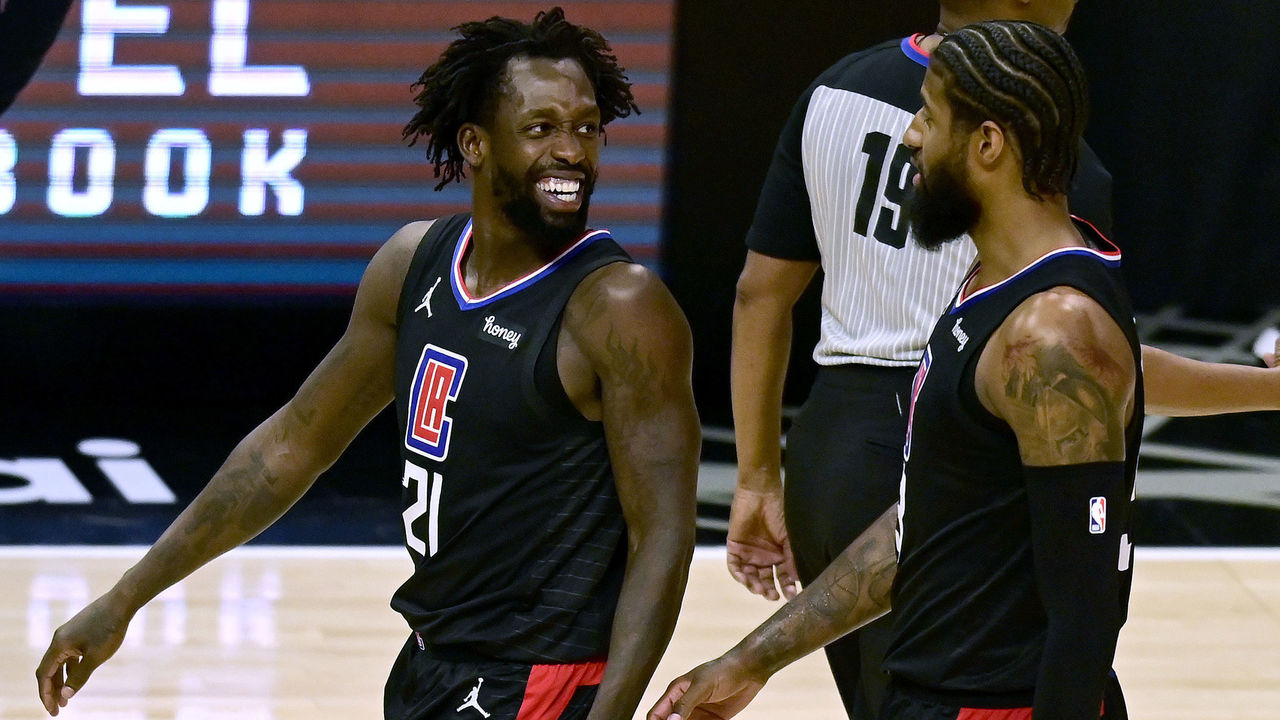
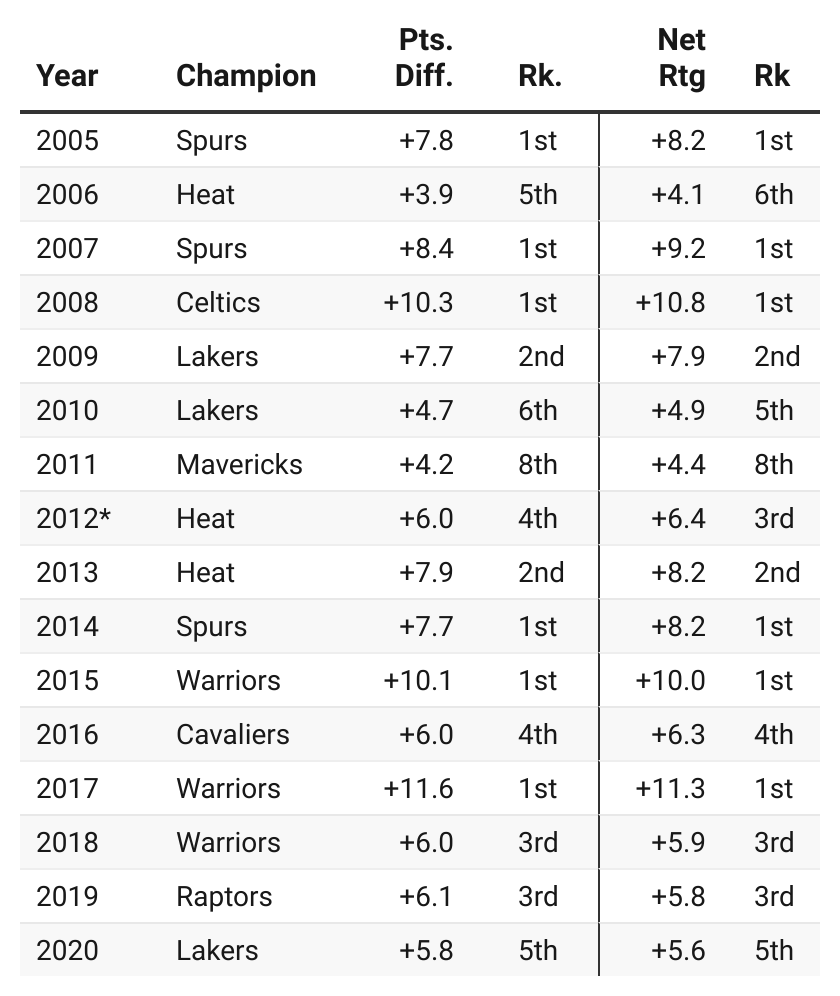
An NBA champion needs to boast a top-eight scoring differential and top-eight net rating per 100 possessions. Specifically, the previous champions have outscored opponents during the regular season by at least 3.9 points per 48 minutes or 4.1 points per 100 possessions. The 2011 Mavs are an obvious outlier here, and a top-five differential might be the more accurate cutoff.
Who fits the bill? Jazz, Clippers, Bucks, Suns, 76ers, Nuggets, Nets
Who doesn't measure up? Hawks, Knicks, Mavericks, Trail Blazers, Celtics, Heat, Grizzlies, Warriors, Pacers, Wizards
Potential outlier: Lakers
The defending champions boasted a top-eight point differential and net rating, but their actual metrics fell short of the specific plus-3.9 and plus-4.1 cutoffs for modern champions. However, the Lakers played a significant chunk of their season without one or both of LeBron James and Anthony Davis, and when they did share the court, L.A. walloped teams by more than 11 points per 100 possessions (Utah's league-leading net rating was plus-9.0). With James on the floor in general, the Lakers still posted a higher net rating (plus-9.2) than the Jazz.
In other words, the healthy Lakers we expect to take the court for the postseason would more than meet our threshold for point differential.
Offense
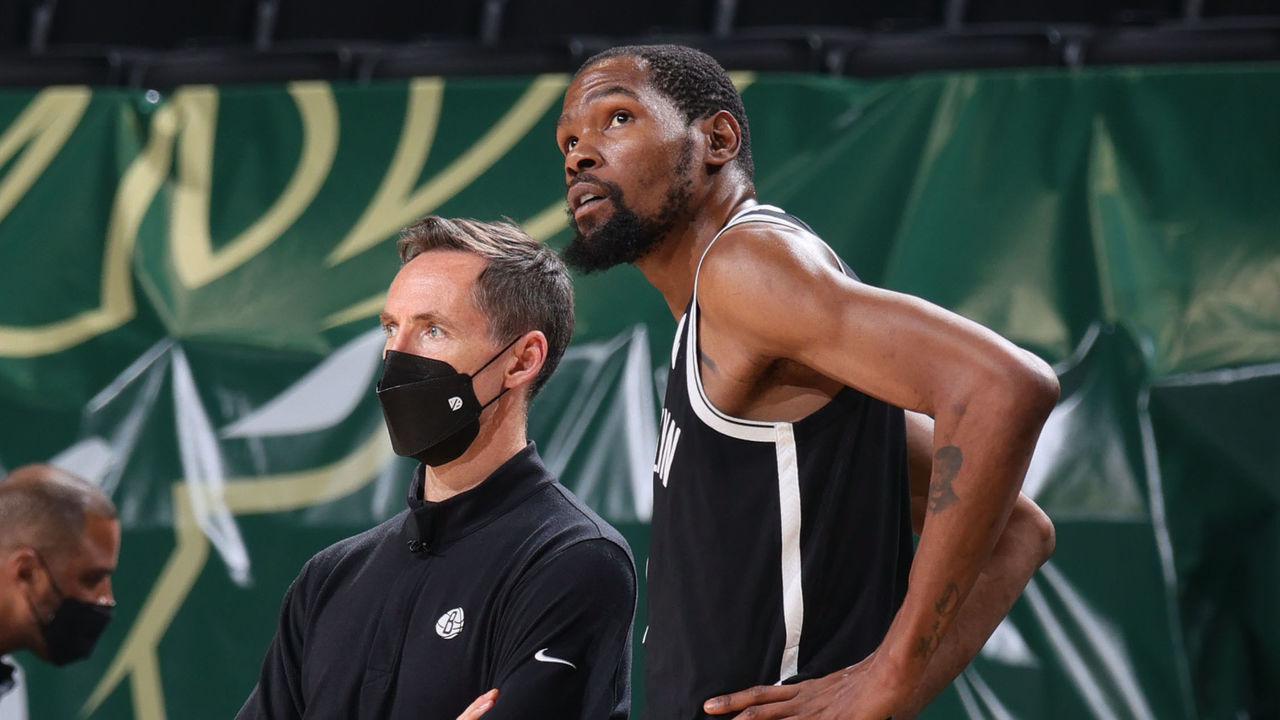
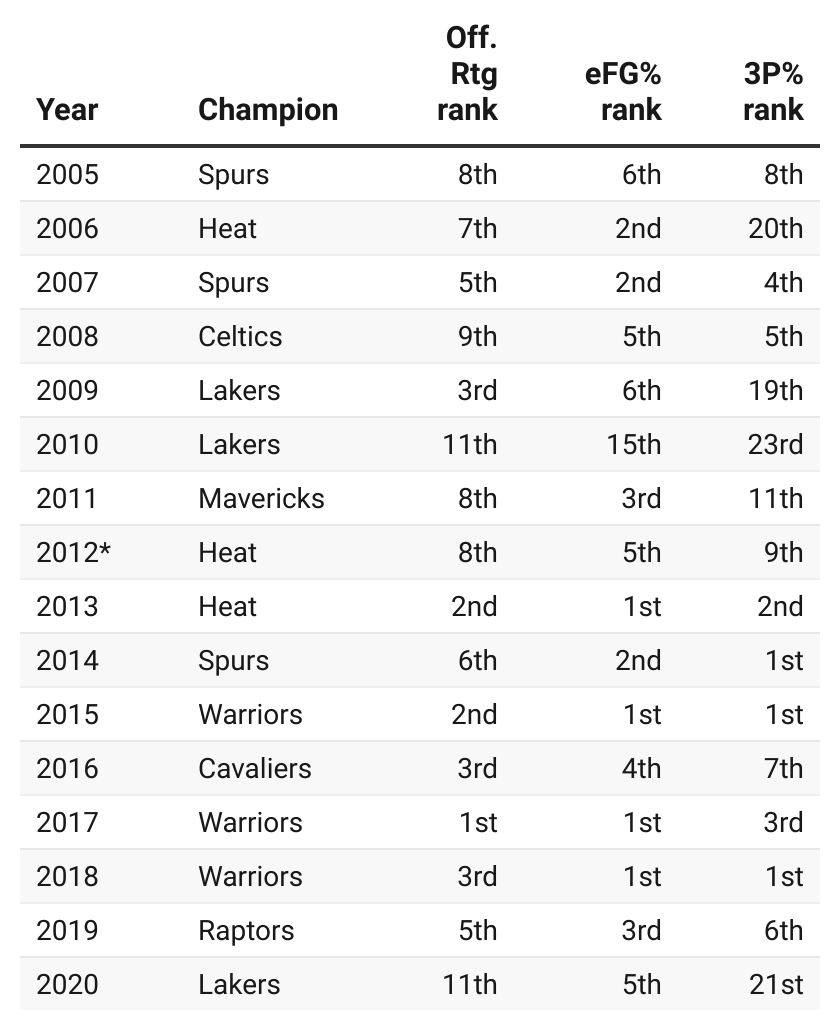
Notwithstanding last year's Lakers and the 2009-10 Lakers, a top-nine offensive rating (points per 100 possessions), a top-six effective field-goal percentage, and a top-20 3-point percentage are all requirements for a championship offense. Dig deeper and you'll find that as NBA offenses have shifted to emphasize the 3-point shot, eight of the last nine champions finished in the top nine in 3-point shooting.
However, in the interest of consistency, we'll include the 2020 and 2010 Lakers and say that the 2021 champion only requires a top-11 offensive rating, a top-15 eFG%, and a top-23 3-point percentage.
Those very modest cutoffs don't really discriminate.
Who fits the bill (expanded version)? Nets, Trail Blazers, Clippers, Jazz, Bucks, Nuggets, Suns, Mavericks, Celtics
Who doesn't measure up? 76ers, Knicks, Hawks, Heat, Lakers, Warriors, Grizzlies, Wizards, Pacers
If we do ignore the 2010 and 2020 Lakers, we could use the 14 other modern champions to determine the requirements are a top-nine offense and top-six effective field-goal percentage. That leaves these teams.
Who fits the bill (limited version)? Nets, Clippers, Jazz, Bucks, Nuggets, Suns
Defense
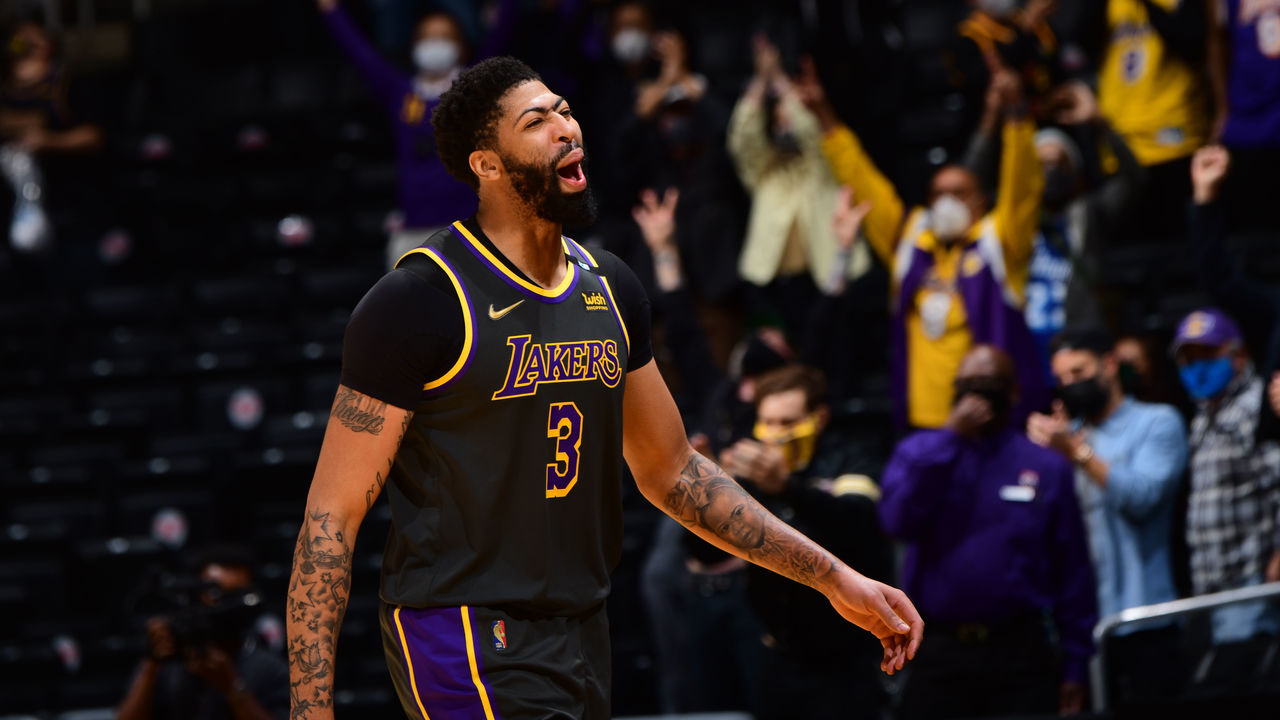
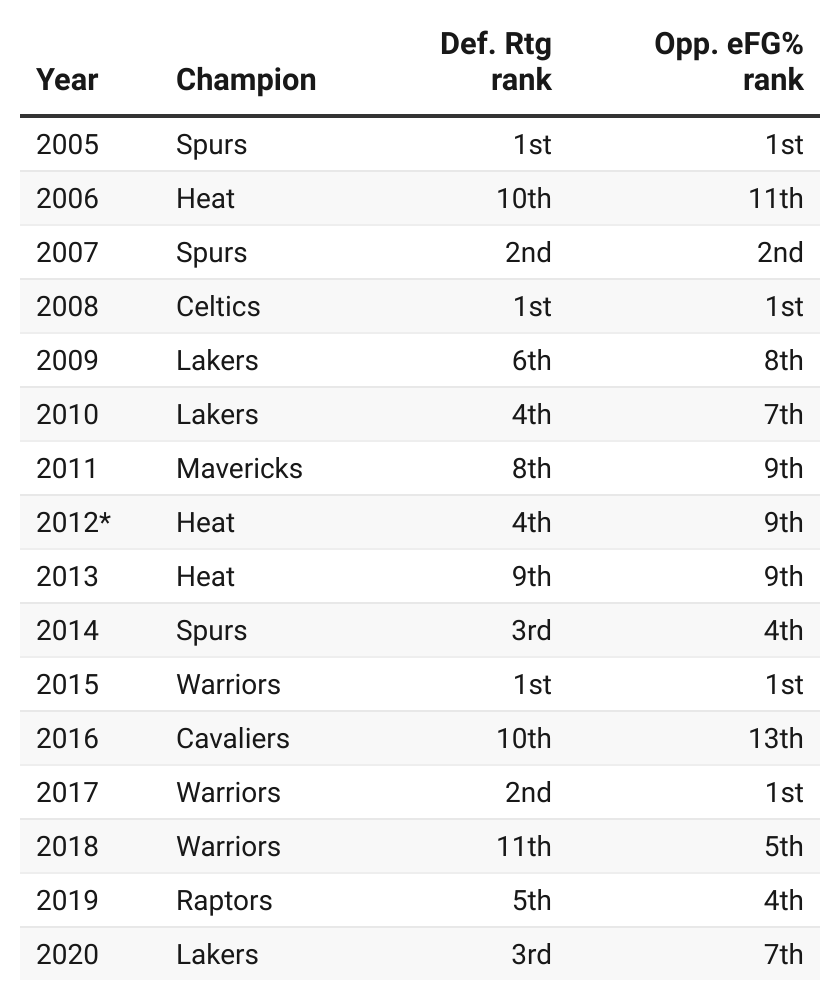
Although offense gets all the attention, every champion in our sample finished in the top 11 on the defensive end, with at least a top-13 mark in opponents' effective field-goal percentage. Also, 13 of the last 14 champions finished in the top eight in limiting opponents' effective field-goal percentage.
Who fits the bill? Jazz, Knicks, 76ers, Lakers, Clippers, Suns, Bucks, Warriors, Grizzlies
Who doesn't measure up? Mavericks, Trail Blazers, Nets, Hawks, Celtics, Wizards, Pacers
Potential outliers: Heat, Nuggets
Both the Heat and Nuggets finished in the top 11 on the defensive end but failed to meet the necessary cutoffs by ranking 19th and 21st, respectively, in opponents' effective field-goal percentage. In addition, Miami didn't rebound well enough on the defensive end, and Denver sent opponents to the free-throw line too often - both issues that are often remedied by postseason attention to detail and officiating. These teams may not meet our defensive cutoff points, but they're both capable of defending well enough to contend.
Star talent
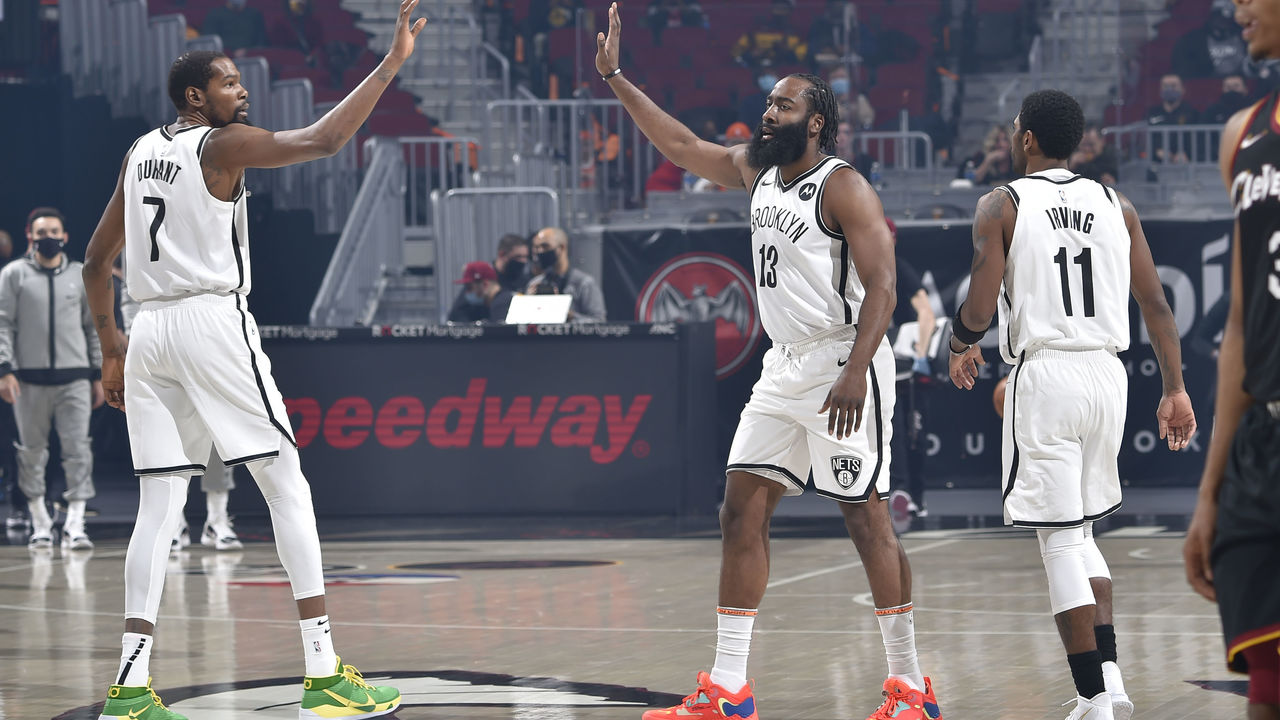
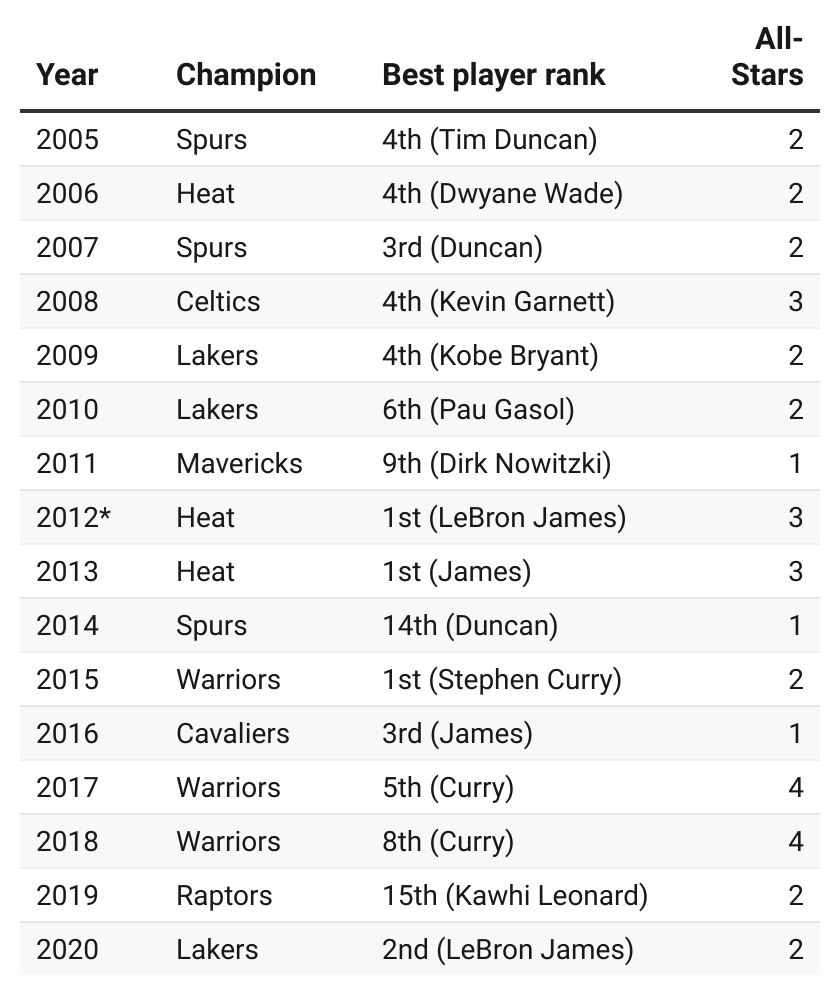
The postseason, not to mention The Finals, is about transcendent talent. Depth can carry you to the playoffs and an All-Star can perhaps drag you into the second or third round. But if you want to compete in June (or, in the case of 2021, July), you need a Hall of Fame-type, generational superstar. There's a reason 38 of the last 41 Finals has featured at least one of LeBron James, Tim Duncan, Kobe Bryant, Shaquille O'Neal, Michael Jordan, Magic Johnson, or Larry Bird. Throw in names like Stephen Curry, Kevin Durant, Kawhi Leonard, Hakeem Olajuwon, and Isiah Thomas, and you get 41 of 41.
There's obviously no way to quantify with 100% accuracy where players rank individually in the NBA, but one fun tool determines how stars stack up based on their average rank across a plethora of catch-all stats. Andy Bailey made this measure famous on Basketball Twitter. According to that data, each of the last 16 champions has had a player rank in the top 15 during the regular season. When you consider how flawless the 2014 Spurs were, and how much better than the 15th-best player Leonard was in 2019 (when regular season games played held him back in the rankings), you realize that a top-10 player - if not top five - is probably what's truly necessary.
You'll also notice every champion featured at least one All-Star, with 13 of the last 16 teams employing more than one.
All 16 champions featured at least one All-NBA selection (10 of 16 had multiple players on the year-end list), and 14 of the last 16 champions boasted at least one All-Defensive team selection. But those awards won't be handed out for weeks, so we can't use them to filter here.
Let's look for playoff teams with a top-15 player this season, according to the average of those aforementioned catch-all stats.
Who fits the bill? Nuggets, Bucks, 76ers, Mavericks, Heat, Clippers, Trail Blazers, Jazz, Lakers, Suns, Nets, Celtics, Warriors
Who doesn't measure up? Knicks, Hawks, Grizzlies, Wizards, Pacers
Potential outliers: Hawks, Knicks
No catch-all method or statistical cutoff is perfect, so does it really matter that Atlanta and New York's best players ranked just outside the top 15? After all, Julius Randle is almost certain to nab an All-NBA spot, and will likely even garner some down-ballot MVP love.
Nevertheless, if we also want to incorporate the fact that 13 of 16 modern champions boasted multiple All-Stars, then only the Sixers, Clippers, Lakers, Jazz, Suns, and Nets qualify.
Home vs. Road
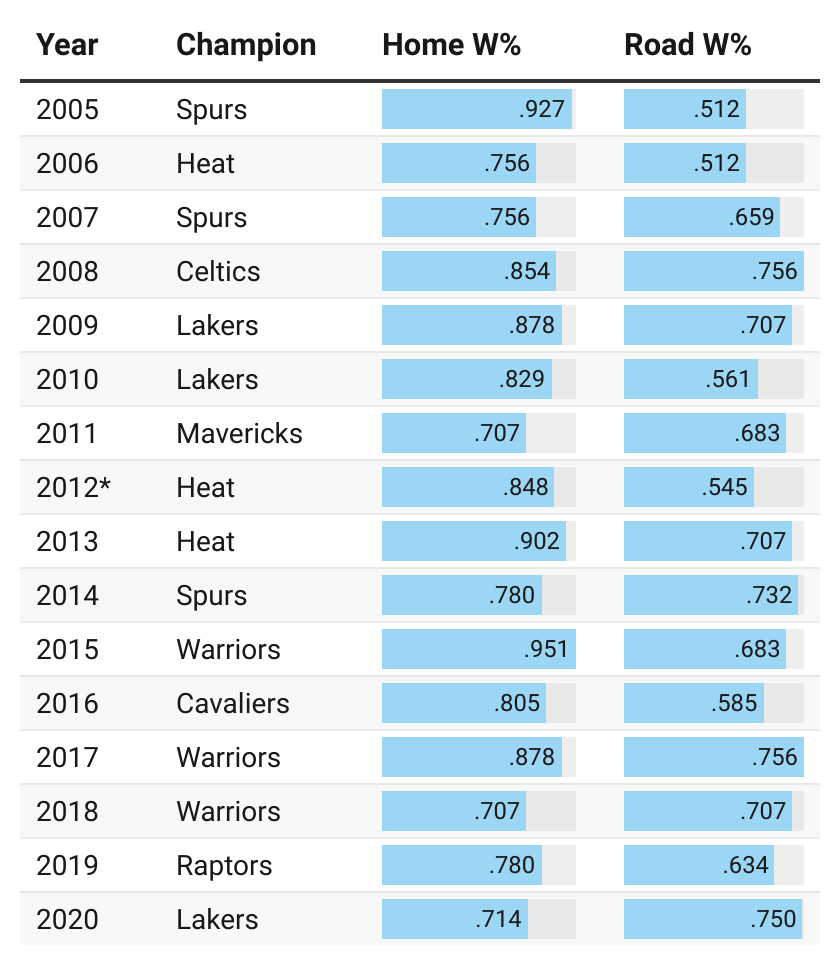
Home-court advantage may not mean as much in 2021 as it did in 2019, but with fans slowly returning to arenas, we inch closer to postseason normalcy. At the very least, home court - and all that comes with it, beyond just fan support - means a lot more this spring than it did in the 2020 restart bubble. Historically, a team that excels no matter where it plays usually has a good chance to contend, so let's look at the home/road splits of recent champions and then compare that to the splits of 2021 playoff teams.
We're looking for teams that dominate at home and, at the very least, still win on the road. Modern champions post a minimum home win percentage of .707 (equivalent to a 29-12 home record in a full season) while also recording a winning record on the road.
Who fits the bill? Jazz, Suns, 76ers, Nets, Clippers, Bucks
Who doesn't measure up? Nuggets, Mavericks, Trail Blazers, Lakers, Knicks, Hawks, Heat, Celtics, Warriors, Wizards, Grizzlies, Pacers
Potential outliers: Everyone
Again, it's tough to use home/road splits from a season that was played in front of mostly empty arenas while heading into a postseason that will only feature moderately filled stadiums. Still, there's something to be said for the consistent excellence of the teams that made the cut.
If you're wondering why some other measurements were left out of this research, I discovered that assist metrics, rebound rates, turnover measures, free-throw frequency, and opponent 3-point percentages didn't produce championship trends as consistently as the statistics cited above. The championship teams we examined often finished in the bottom third in at least one of those categories.
Who's left standing?
Only two teams managed to check every box, with the Jazz and Suns entering the playoffs as the clear-cut favorites when considering the statistical profiles of modern NBA champions (though neither team is a betting favorite).
In addition, the only thing holding the Clippers back is that every modern champion finished top five in the overall standings, while the 2021 Clippers officially finished sixth. Again, however, L.A. did match the record of fifth-place Denver - and shamelessly tanked the final weekend of the season to seemingly avoid the Lakers' side of the West bracket - so I'm including the Clippers alongside Utah and Phoenix as having met the historical requirements of a contender.
Phoenix being in this category is most remarkable, as the Suns haven't played a postseason game in 11 years, and hadn't even cracked the 40-win mark in seven years. Not since the 2007-08 Celtics - who went on to win the title after acquiring Kevin Garnett and Ray Allen - has a team become a full-blown contender so swiftly (although I suppose you can make an argument for last year's Lakers, who ended a seven-year postseason drought to win the title).
Potential outliers: Lakers, Nets
We've already noted how dominant the Lakers are when James and Davis are healthy, and the defending champs almost certainly would've met the necessary championship cutoffs had the star duo not missed a combined 63 games. Needing to win a play-in game against Steph Curry's Warriors before drawing the rested Suns changes the equation, however.
As for the Nets, the trio of Kevin Durant, James Harden, and Kyrie Irving played just eight games together, and even Brooklyn's lagging defensive metrics measured as surprisingly competent at high points of the team's season. If the Nets or Lakers emerge victorious a couple months from now, it won't be the tale of a team bucking the championship trend as much as it will be the tale of a team whose regular season wasn't indicative of its potential.
Wondering where the Sixers, Bucks, and Nuggets are? Philadelphia didn't score efficiently enough to qualify, Milwaukee finished outside the top five in the overall standings, and the (Jamal Murray-less) Nuggets didn't meet the necessary defensive requirements.
Just happy to be here: Hawks, Wizards, Pacers
Atlanta's the only surefire playoff team without a single championship indicator, though the Hawks only narrowly missed the thresholds on offense and in the "star talent" category. One of Washington or Indiana will join them in this category once the East play-in is decided.
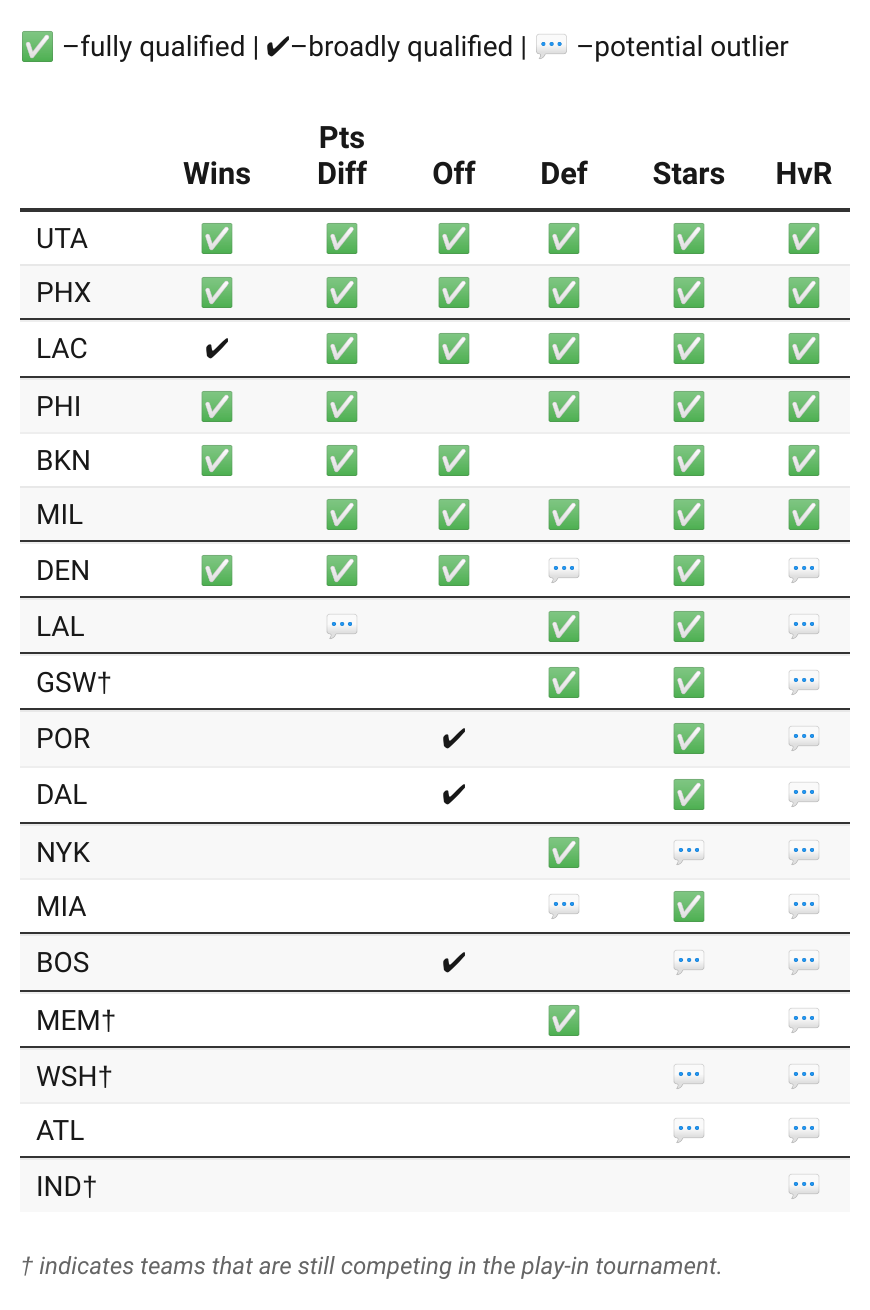
Joseph Casciaro is a senior writer for theScore.